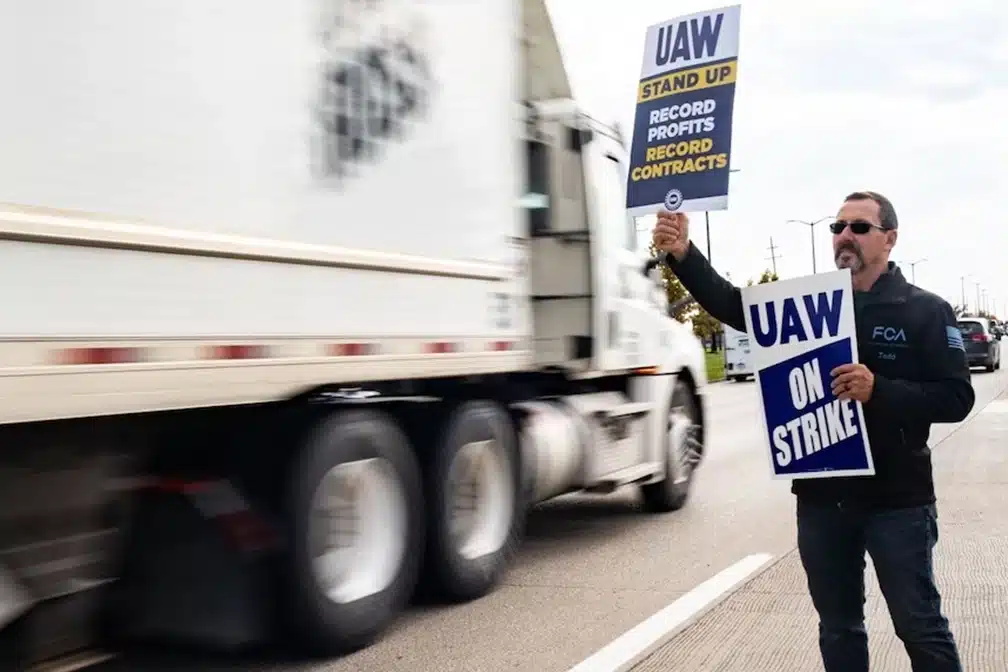FedEx Corp. has issued a warning about the potential financial and safety impacts that could arise if the Biden administration approves specific waivers related to truck driver
Continue Reading
May 19, 2024 6:12 pm

The recent triumph of the United Auto Workers (UAW) in securing unprecedented contracts with the Big Three Detroit automakers—Ford, General Motors, and Stellantis (formerly Fiat Chrysler)—marks a significant milestone in labor relations within the U.S. automotive industry. This expanded article delves into the multifaceted impact of these contracts, analyzing their implications for UAW workers and the auto industry, car buyers, the broader economy, and competitors like Tesla.
The new deals promise substantial benefits for the 150,000 workers under these contracts. They include wage increases of at least 25%, and in some cases, as much as 168% for temporary workers. For instance, Brandon Bell, a worker at Ford’s Michigan Assembly Plant, could see his hourly pay rise from $20 to $35 by December if the contract is ratified. This significant boost in earnings reflects the UAW’s focus on reclaiming the pay and benefits forfeited in the past. It aims to reestablish auto industry jobs as a gateway to a secure, middle-class lifestyle.
These contracts, however, increase labor costs for the Big Three, intensifying their competition with non-unionized rivals. While analysts like Tom Narayan from RBC Capital view this as a challenge rather than a catastrophic setback, the increased costs are undeniable. Ford and Stellantis have assured investors about their future profitability. Still, the ripple effects are expected to influence even non-unionized companies and suppliers, leading to a general upward push in wages across the industry.
The higher labor costs will inevitably affect car prices. Ford anticipates an increase of $850-900 in the production cost of each vehicle. However, passing these costs to consumers might be challenging in a market where new car prices have surged by 30% post-pandemic, averaging around $50,000. The alternatives for automakers include absorbing these costs through reduced profits or cutting expenses in other areas.
These deals are poised to inject substantial funds into communities around UAW plants, enhancing local economies. They also exert upward pressure on wages in various sectors. However, there is a potential downside: increased wages and auto prices could contribute to inflation, complicating the Federal Reserve’s economic management efforts.
Under the leadership of Shawn Fain, the UAW has adopted an aggressive stance, framing negotiations as a battle between the working and billionaire classes. The successful contracts are just the beginning, with the UAW aiming to expand its influence by organizing foreign automakers in the South and targeting Tesla. Toyota has already responded with a 9% pay raise for its U.S. workers, indicating the broader influence of the UAW’s actions.
Unionizing Tesla remains a significant ambition for the UAW. Despite the challenges, including Tesla’s providing stock options to employees and Elon Musk’s opposition to the UAW, the union’s recent successes and changing public opinion towards labor organizations may renew efforts to make inroads at Tesla.
The UAW’s successful negotiations with the Big Three represent a pivotal moment in labor relations within the U.S. auto industry. While the immediate benefits for UAW workers are clear, the long-term impacts on the automotive sector, economy, and labor movement are more complex and multifaceted. The unfolding dynamics will significantly influence the future trajectory of the industry, worker compensation, and unionization efforts.
FedEx Corp. has issued a warning about the potential financial and safety impacts that could arise if the Biden administration approves specific waivers related to truck driver
Continue ReadingHuman trafficking, a modern-day form of slavery, thrives in the shadows of society, exploiting vulnerable individuals for profit. As the world grapples with this grave issue, "Truckers
Continue ReadingJennifer Homendy, the Chair of the National Transportation Safety Board (NTSB), has raised concerns about the potential negative impact of a government shutdown on the transportation industry,
Continue ReadingThe American Trucking Associations (ATA) has expressed strong opposition to the Department of Justice's proposed rule of marijuana reclassification.
Continue ReadingConnell High School in Connell, Washington, has formally petitioned the FMCSA to allow students under 18 to obtain commercial learner's
Continue ReadingIn an effort to increase efficiency and sustainability in Trucking, Phillips Industries has launched their new, advanced, stick-on solar panels
Continue ReadingThe U.S. government is increasing scrutiny on Chinese companies that are potentially dodging tariffs by manufacturing Chinese EVs (electric vehicles)
Continue ReadingIn a legal battle that could reshape the trucking industry, 24 Republican states join to bring a lawsuit against the
Continue ReadingOOIDA • ATA • DOT • NASTC • WOMEN IN TRUCKING • NPTC • DRIVER RESOURCES • TDN STAFF • ARCHIVES • SITEMAP